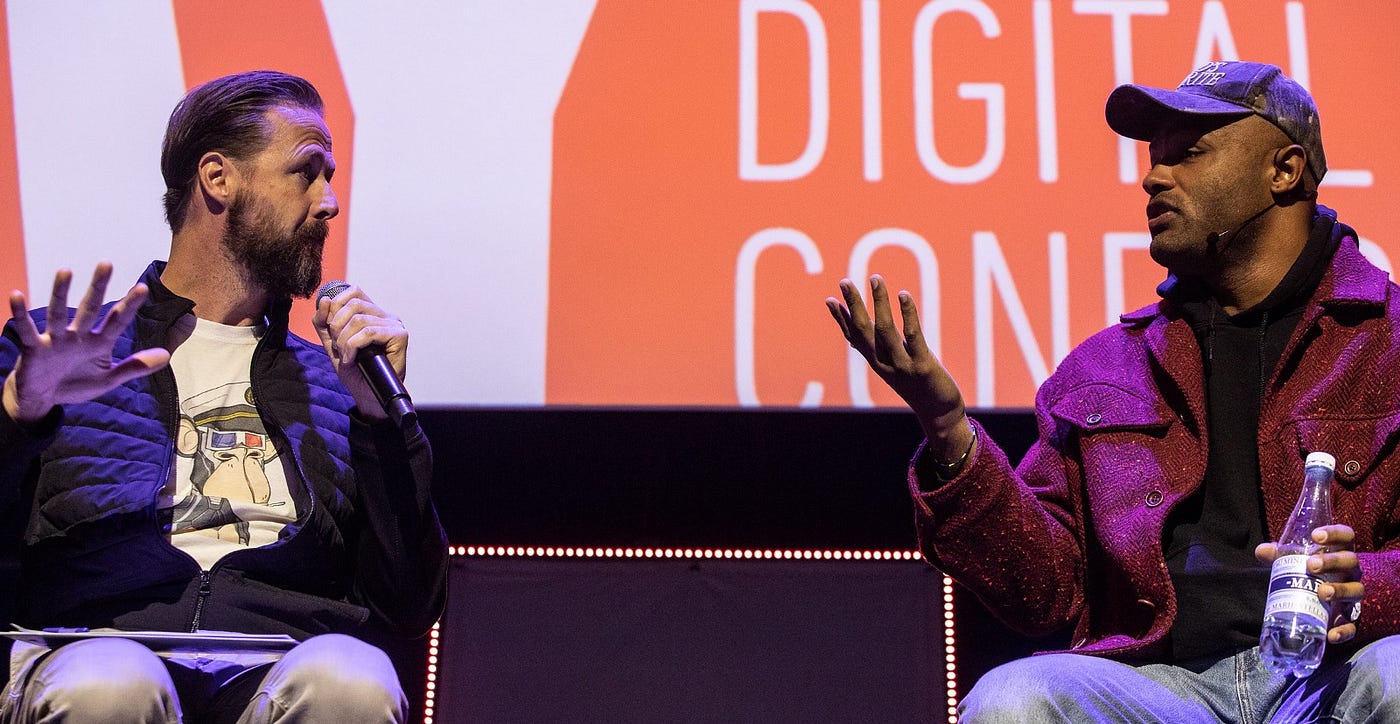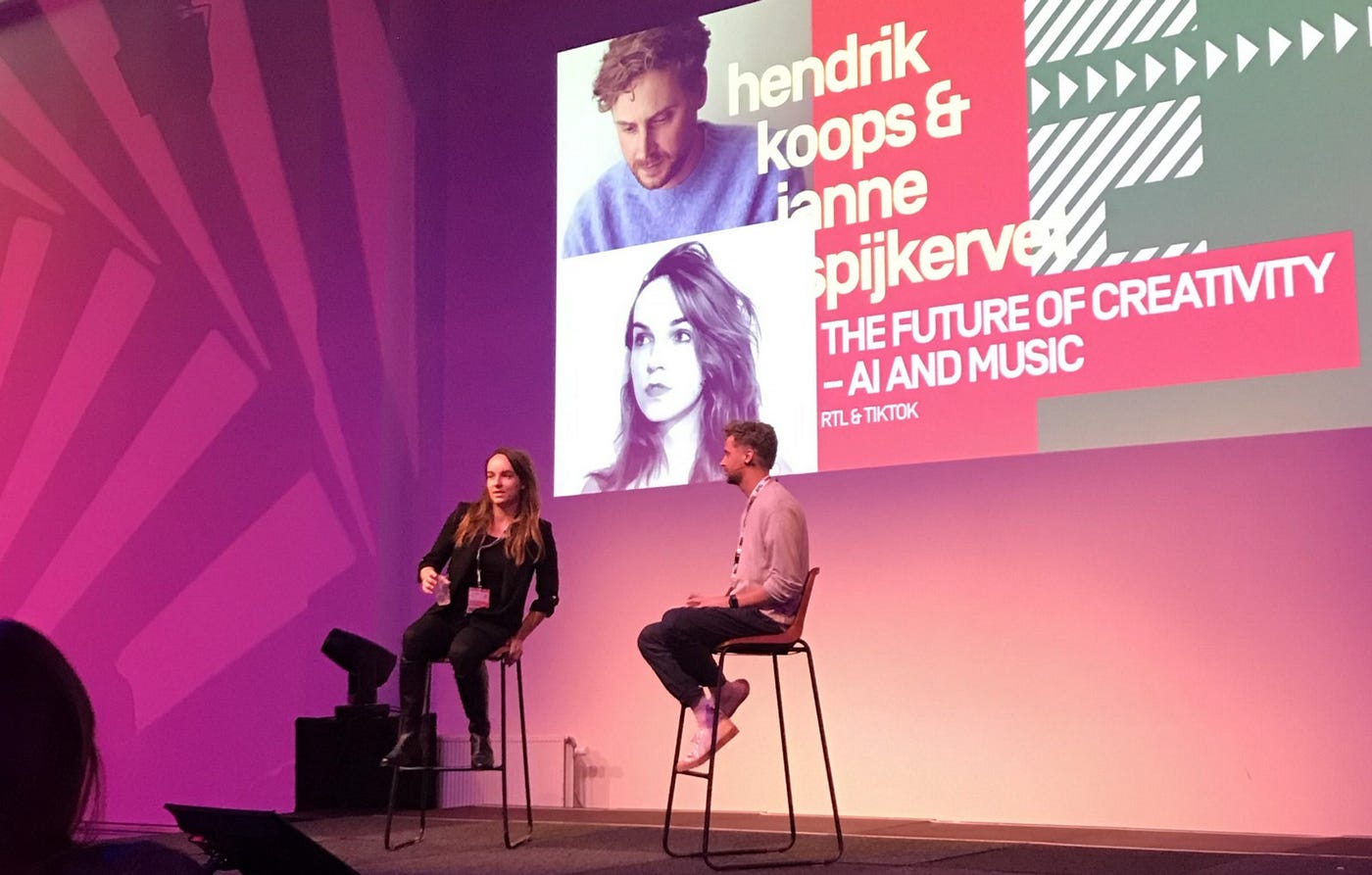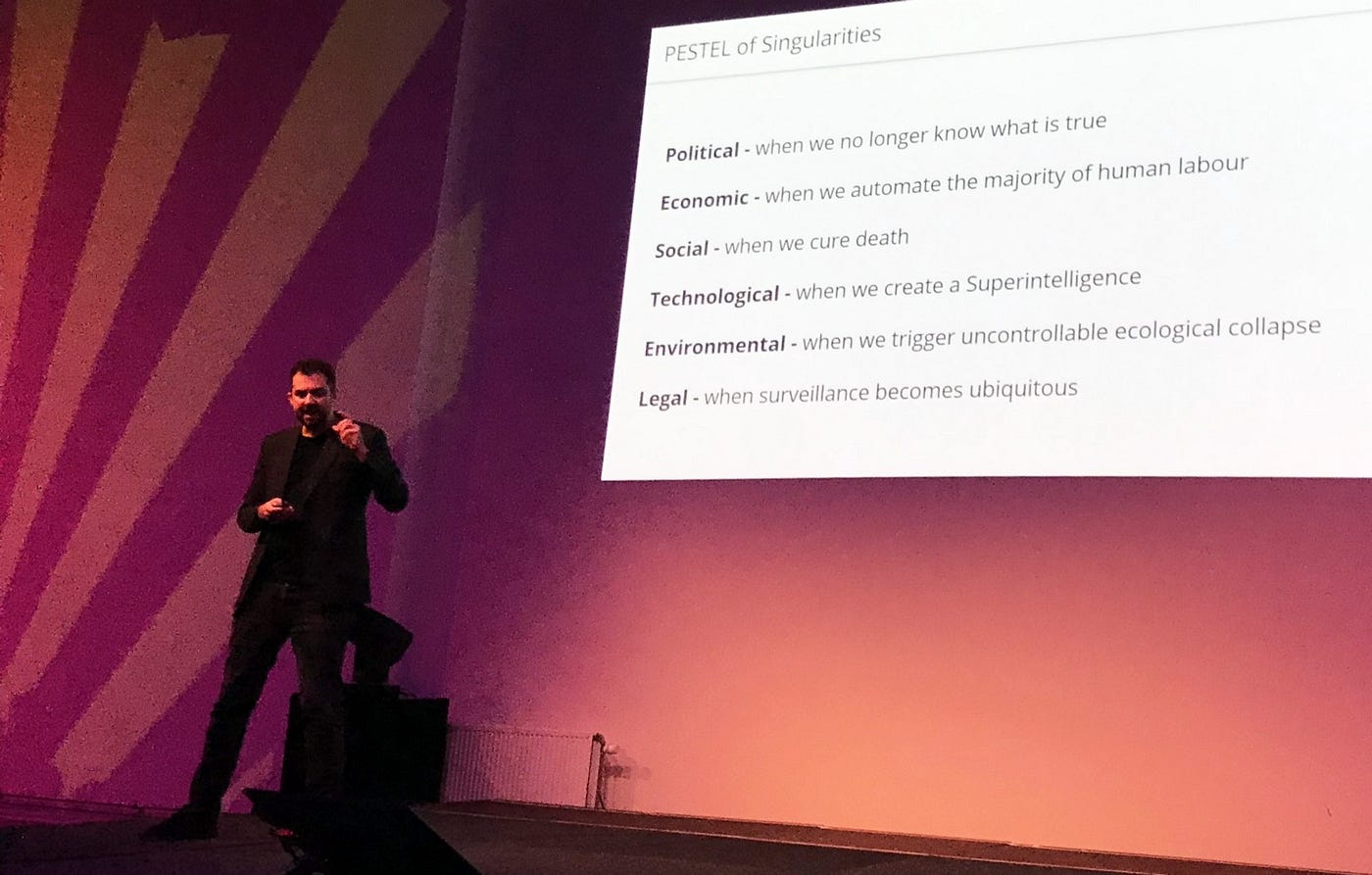
What I learned at Emerce Eday 2022
Thursday 6 October I was at Emerce Eday 2022, and I learned that Web3 is indeed not my thing, it is certainly not China’s thing, Artificial Intelligence can be a creative power tool, and we have to prepare for 6 singularities.
The central heating of the philosopher of the people
Philosopher of the people Bas Haring told us about his central heating. He once had to assemble it himself due to a lack of money. All those pipes, hoses, couplings, it all was very intimidating to him. But once he got into it, it was actually quite understandable. His point: it’s the same thing with tech. Don’t let it scare you, go head to head! Take matters into your own hands, and a world of new possibilities will open up to you!
 Bas Haring (photo by Peter Boer)
Bas Haring (photo by Peter Boer)
Taking matters into your own hands
Taking matters into my own hands, I had already become enthusiastic about that the night before. When I immersed myself in Eday’s program I came across the book by Laurens Vreekamp. And I ordered it right away. His book shows how Artificial Intelligence (AI) can be a tool for every maker. So I want to give that a go!
 Book “The Art of AI”
Book “The Art of AI”
Because I had already ordered his book, I thought I could skip his lecture… A dumb case of FOMO. Now I was listening to a disappointing story by B. Earl about Chiwawows, comics, and letting kids buy NFTs with their pocket money. Anyway, at least he agrees that “NFTs are just another platform”.
The Web3 Gospel
Trevor McFedries also wants to take matters into his own hands. As a creator, he proclaims the gospel of Web3. Because on Web2, creators depend on centralized platforms, such as Instagram or TikTok, to distribute their work. And those platforms then run off with the (advertising) income. According to Trevor, Web3 is an opportunity for creators to take back power. With their own tokens, they can make people pay for their work directly. And they can organize themselves in DAOs (decentralized autonomous organizations), independent of the central platforms. In their DAOs, they vote on what to spend their tokens on, and share dermatology and parenting tips (yes, really) on their DAO member-exclusive Discord channels.
 Moderator Jim Stolze with Trevor McFedries (photo by Peter Boer)
Moderator Jim Stolze with Trevor McFedries (photo by Peter Boer)
The digital Chinese wall
One place where Web3 is certainly not going to break through is China. Decentralization, citizens taking matters into their own hands; that’s not really the thing of the Chinese government. Our western Web2 apps such as Youtube or Whatsapp are also banned, said Manya Koetse.
Behind the Digital Great Wall of China has emerged its own state-controlled, advanced, and rapidly developing internet. Here, everything revolves around centralization and control. And instead of what we’re used to, in China it’s not common to use separate apps for things like chat or video. Instead, China has “super apps” such as WeChat, which unite all these functions in one app. According to good Chinese custom, the government monitors everything. Even your COVID certificate can be found on WeChat.
 WeChat can do anything
WeChat can do anything
In addition, the government has set up Skynet, a network of hundreds of millions of surveillance cameras. With the help of AI, everyone is recognized and monitored in this way. In addition to these “passive” cameras, experiments are now underway with “robocops”. These are self-driving cameras that can recognize faces with the help of AI, and help the “analog” police to arrest suspicious persons.
And the Chinese youth? They love it. The nationalistic and super selfish result of the one-child policy is proud of their country. For them, it is no longer cool to buy premium western brands. They now buy premium Chinese brands, “proudly made in China”.
Creative with AI
So AI is very useful if you want to keep an eye on 1.4 billion people. But you can also do more creative (and more innocent) things with it. Hendrik Vincent Koops and Janne Spijkervet use AI to compose music. Hendrik Vincent Koops has been in the organization of the AI Song Contest for a few years now. Here musicians compose music together with AI. Together with AI, because letting AI compose music on its own, that’s not (yet?) possible. They use “little AI systems” for different parts of the music, such as the rhythm, the lyrics, or converting one instrument into another.
 Janne Spijkervet and Hendrik Vincent Koops
Janne Spijkervet and Hendrik Vincent Koops
Janne Spijkervet works at TikTok (because we are allowed to use Chinese apps). The need for music under all those videos and commercials is so great that they use AI to meet the demand for all those tunes. She also once explained to an algorithm what a proper dutch smartlap is, hoping to make the ultimate tearjerker.
A world of abundance
I don’t know if Daniel Hulme is musical, but he does have a few ideas about AI. In the short term, he uses it to create new, flat organizations. And in the longer term, hopefully, a world of abundance.
Let’s talk about the short term first. What happens if you do not only use AI to optimize for example the advertisements for your organization, but your organization itself? Daniel uses AI to create flat, horizontal organizations. In these “swarms” with no hierarchy, AI helps determine who works with whom on what, and what salary everyone earns. In addition, he proposes a digital twin of your organization. With this digital copy, you can experiment and optimize your organization. For example, what happens if a person leaves the organization? Or what are the best kinds of people for you to hire?
Then the longer term. Because what happens when humanity makes their final invention; an artificial superintelligence more intelligent than us? Indeed, when we reach singularity?
 Daniel Hulme and his 6 singularities
Daniel Hulme and his 6 singularities
Daniel doesn’t stick to one singularity, he distinguishes six of them. He does this on the basis of the business analytic PESTEL model. That superintelligence is the technical singularity. He also sees a political, economic, social, environmental and legal singularity.
According to him, AI plays a major role in achieving those singularities. Singularities that can cause a lot of problems, because they completely turn upside down our current way of life. Problems we may also be able to solve with AI. Daniel is convinced that this is possible (unfortunately he does not explain how, but hey, he only had 30 minutes). According to him, if we do everything right, we can then live in a world of abundance. When we reach that point, hopefully, we succeed in explaining to the superintelligence why we should still be part of that world.
(Daniel’s whole talk (for another conference, he apparently gives it more often) is also on YouTube)
 (photo by Peter Boer)
(photo by Peter Boer)